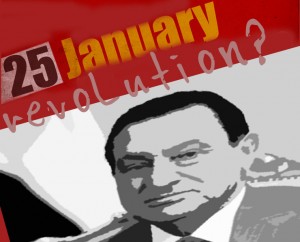
I met a man a few days ago who believes that the revolution has not been televised because there has not yet been a revolution.
“The people may have succeeded in toppling Mubarak,” he says sucking forcefully on a cigarette. “But that same regime in a different form is still in power and still arresting and torturing civilians for demonstrating against them.”
The forty-something tourism consultant believes there will be no revolution until the old regime is removed entirely.
“Mubarak was a bad man, sure. But there were a lot of bad men working alongside him too and the majority of those men are still calling the shots today, that’s why so many of us continue to demonstrate.”
There are other reasons of course. Many of the people who have continued to brave the 40 degree heat of the unsheltered Tahrir Square want justice for those killed in January’s protests. They wanted Mubarak’s trial to happen sooner rather than later – for the verdict to be dished out before he dies in an air-conditioned room of an elite Sinai hospital. These are thirsty demonstrators who have continued to stand in Cairo’s harsh sunlight cradling pictures of deceased men – some boys, barely old enough to have finished high school; others, fathers and breadwinners – their faces large print-outs on sheets of paper glued to cardboard.
The tourism consultant understands and supports these demands however he questions the feasibility of any justice being served a moment before the establishment of an entirely new, democratically-elected government.
“Justice now? How can it be possible? Take the police, for instance. Just five months ago they were firing at us, torturing us – hiring thugs to lute our precious, national treasures and create a general appearance of chaos and lawlessness. They – this same group of men, are still the law today here in Egypt. We need new law enforcement, new everything.”
Although many businesses and the majority of governmental services have been left in a state of disarray since the start of the year, the level of organisation and efficiency at a grass-roots level at least, is rather spectacular. At Tahrir Square, community-appointed volunteers surround its periphery with make-shift checkpoints; each on-coming demonstrator is frisked, has their belongings searched and their identity card scanned before being granted entry. To keep things respectable, there’s even a separate entrance for men and women, the young female volunteers apologising politely before making physical contact. Entrepreneurs sell flags and T-shirts and young hustlers chase English-speaking tourists around the square, imparting revolutionary anecdotes in exchange for Egyptian Pounds.
This morning, Egyptian state-run media has reported that Mubarak has left the hospital in the resort town of Sharm el Sheikh for the 1st day of the scheduled trial in Cairo. He is facing charges of corruption and ordering forces to fire on demonstrators. If he is convicted of the pre-meditated killing of protesters, he may receive the death penalty. State television will broadcast the trial live from the Cairo Police Academy – a large complex which was ironically once called ‘The Mubarak Academy.’
The trial of the ousted president will be watched closely by all Egyptians regardless of whether they have been ambivalent about the demonstrations up until this point or not. This is the first time that an Arab leader who has been removed by his own people has been put on trial by his own people. Irrespective of where the nation is at present in its quest for a new beginning, the outcome of this court case will be critical in determining the next course of action. As passionate groups of pro and anti Mubarak demonstrators form outside the Academy, the very emotional and complex nature of the trial serves as a reminder that a sense of closure is unlikely to arrive anytime soon. A severe verdict is likely to be appealed in a process that could take up to several months, which means for the tourism consultant at least, the revolution of his dreams could still be a very long way away.
